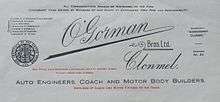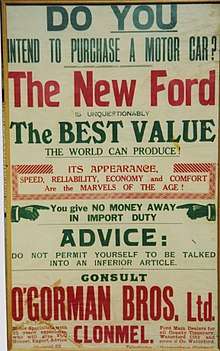O'Gorman Coach Builders
O'Gorman Coachbuilders was an Irish coach building company that traded under various names from the 1920s to the 1940s.
.jpg) O'Gorman Brothers Garage in 1922 | |
| Traded as | O'Gorman Bros, O'Gormans, John O'Gorman & Sons, J.F. O'Gorman Ltd. |
|---|---|
| Founder | John Francis O'Gorman |
| Headquarters | , |
| Products | Coachbuilders and Motor Engineers |


History
John Francis O'Gorman (4 February 1875 – 27 December 1943) and his brother James (6 February 1877 – 23 October 1963) came to Clonmel, County Tipperary, Ireland in 1899, shortly before the death of their father. They worked as apprentices at Cleary's Coachbuilder in Anglesea Street, Clonmel.
John F.O'Gorman completed his learning in London and was appointed by the Department of Agricultural and Technical Instruction, to teach the Theory of Road Carriage Building. He first traded as O'Gorman Bros, Address: 12 Wellington Street, Clonmel.[1] and advertised 'Motor Bodies of every description built on the premises'. They were special Agents for Austin, Humber and Ford cars. Shortly after the First World War, John F. O'Gorman went to Germany and captured the first main dealership in Ireland for Mercedes-Benz cars.
The 'O'Gorman' Coachbuilding business grew around 1920, when John F. O'Gorman bought and built a factory located at Prior Park, Clonmel, County Tipperary, Ireland. He also bought the stately 'Prior Park' house, which doubled as a store area, for the company. Together with his brother Jim, they made various horse-drawn two and four wheel vehicles. They also manufactured traps, gigs, landaus, jaunting carts, carriages, floats and dray carts. The main business however, was building bus, coach, van and lorry bodies.[2]
Subsidiaries
South of Ireland School of Motoring
In the late 1920s this enterprise, situated at the factory premises, held a ten-week course at the school and included (a) Mechanism and Ignition and (b) Driving and Tyrefitting. The ten weeks tuition cost IR£15 with a shorter session of three weeks at IR£10.[3]
O'Gorman's, Clonmel
The administrative offices of O'Gormans were situated over the shop front show room, garage at 36 & 37 Parnell Street (next to Hearns Hotel, where Charles Bianconi established his horse-drawn coach travel empire, 90 years earlier).[3][4]
Operations
1920s
1923 - Strike breaking
The O'Gorman brothers were discussed in Dáil Éireann Volume 3–18 May 1923 with regard to a strike at their Clonmel factory and bringing in workers (non-union strikebreakers) from London. The firm was engaged on several Government contracts, including building two limousines for a high official. It was proposed the company should not be allowed to carry out Government work, under conditions which are a distinct breach of the Fair Wages Clause.[5]
1927 - Supplying army lorries
O'Gorman Brothers supplied Mercedes-Benz 4 ton vehicles to the Irish Free State army authorities in 1927. Further details of the vehicle are listed in Commercial Motor on 10 May 1927 and 27 May 1927, Page 80..
In the late 1920s, Irish coachbuilders were at their busiest, working on big bus-body orders. O'Gorman Brothers, employed over 100 men on one of their biggest bus orders.[6]
1928 - Coachbuilders seek protection
The Irish Free State Tariff Commission considered the application for the Imposition of a Protective Tariff. Details of Coachbuilding in the Irish Free State was provided by J.F.O'Gorman. He said very few bodies for motor vehicles were made in the Free State in 1927. If they obtained a tariff they would be quite capable of providing all the commercial vehicle bodies required for the Free State. He also said there was some difficulty in procuring skilled men, many of them having been attracted to England by higher wages.[7]
1929 - Tariffs on imports
J.F. O'Gorman called on the Government to place an effective tariff on the import of coachwork and motor bodies. He said there had been an exodus of highly skilled labour from the bodybuilding industry and the industry is capable of dealing with the country's requirements.[8]
1930s
The chassis for the vehicles in the 1930s, were assembled in County Cork and collected by the firm's mechanics. The Clonmel factory was the largest such establishment in the South of Ireland at the time and one of the most modernly equipped factories in the country. The first mechanical paint sprayer outside Dublin and Cork was installed at O'Gormans. The factory was renowned for its strict discipline.[2] O'Gorman Brothers were the Ford Motor Company main dealers for all County Tipperary, Waterford City and portion of County Waterford. A number of O'Gorman Brothers single decker buses were built for Irish Omnibus Company. Several of them are listed in 1932 and 1934, on the Classic Irish Buses website.[9]
John F. O'Gorman voiced a complaint in the Dáil Éireann, Section 554 - 25 February 1931,[10] about the ease and amount of ash being exported (the principal raw wood material for the industry).
Messrs O'Gorman, were also quoted by Seán Lemass during a Dáil Éireann debate, Volume 45 - 22 December 1932 (Finance (Customs Duties) (No. 4) Bill, 1932—From the Seanad Éireann), where they claimed: the works had been occupied during the civil war, by not merely members of the Republican Army, but also by members of the National Army (The National Army was questioned by Patrick McGilligan) and that the damage done during that period had not been adequately compensated for by the Government.[11]
The O'Gorman Coach building business continued trading until J.F. O'Gorman's death in 1943 and went into liquidation, following a downturn during the Second World War.
During its operation, the company traded variously as 'O'Gorman Brothers' (to 1933), 'O'Gormans', 'John O'Gorman & Sons', 'J.F.O'Gorman (1933) Ltd' then 'J.F.O'Gorman Ltd' (until J.F.O'Gorman's death in 1943).
Prior Park factory and house
Around 1920 the stately Prior Park house and grounds were bought by J.F. O'Gorman (who owned the garage in Parnell Street). Much of the finance for this purchase, came from his first wife Margaret.
On part of the grounds near Clonmel railway station, a large factory was built, to make bodywork for road vehicles. A separate building was also constructed as a Varnish area. After J.F.O'Gorman's death, the site was sold to Curran Signs & Graphics Ltd. When Curran moved, the factory was sold to developers and it is now, residential Ormonde Court.
Prior Park house, lived in by John F. O'Gorman and his large family,[12][13] was originally a girls' boarding school (run by Quakers). The basement and unused servants' quarters were used to hold company stores. After his death in 1943, ownership passed to his second wife Catherine. When she died in 1970 it was passed to three of their children, who were living there at the time. Prior Park House was demolished in 1997 and the area is now, Redwood Gardens, named after the giant California redwood trees that used to grow around the grounds.[14] The area is still known as 'Prior Park', which is north of the Oakville Estate.[15]
J.F. O'Gorman
John F. O'Gorman was reared near Glennagat, close to New Inn, County Tipperary. He had two sons from his first wife, Margaret Smyth of Ardfinnan, County Tipperary (1878–1927). After her death he married again on 16 January 1929, Catherine O'Brien of Shanagolden, County Limerick (1902 - 20 October 1970) and they had 5 boys and 4 girls.[16] Whilst in Clonmel, J.F.O'Gorman lived at: (1) 17 Dillon Street (He originally didn't have an 'O' in his surname)[17] (2) 6 Prince Edward's Place (renamed to Dr Croke Place)[18](3) Sweetbriar Lodge (4) Prior Park House.
He became well known locally, for his business skills and entrepreneurship. In his obituary in The Nationalist, it describes him as having exceptional ability and he took a keen interest in the development of Irish industry generally and worked for its advancement for many years, especially in Clonmel. It also reported that he was largely responsible for the formation of the Irish Motor Traders' Association. A body now called SIMI, Society of the Irish Motor Industry, which was formed when the Society of the Irish Motor Traders Ltd and the Irish Motor Traders Association merged in 1968.
In April 1925 a group of local business people including John F. O'Gorman established the Clonmel Chamber of Commerce — J.F. O'Gorman was elected as their first president. William Magner (famous for Magners cider manufactured in Clonmel) was elected as vice president.[19]
Glass negative photographs
In April 1922 and April 1934, high quality 'hlass negative' photographs, were taken by A H Poole & Co. In 2012, some were placed on the internet by the National Library of Ireland (NLI).[20] They are of vehicles being built at Prior Park garage and the shop front in Parnell Street. They include a picture of J.F.O'Gorman, the directors, workers, the factory premises, Prior Park house and various machinery in the workshop.[21][22][23][24]
Gallery
 A trap by the River Suir, Clonmel, built by O'Gorman Bros.
A trap by the River Suir, Clonmel, built by O'Gorman Bros. Bodywork by O'Gormans
Bodywork by O'Gormans O'Gormans factory
O'Gormans factory GODKIN & Co van built by O'Gormans
GODKIN & Co van built by O'Gormans Prior Park house shortly before it was demolished in 1997
Prior Park house shortly before it was demolished in 1997 Mercedes-Benz Chassis. Bodywork by O'Gorman Bros.
Mercedes-Benz Chassis. Bodywork by O'Gorman Bros._presents_a_Ford%2C_built_by_J.F._O'Gorman_Ltd_(Note_unusual_opening_of_door).jpg) The Mayor of Clonmel presents a newly built Ford outside the factory
The Mayor of Clonmel presents a newly built Ford outside the factory_Ltd.jpg) Company headed paper
Company headed paper.jpg) Bodywork by O'Gorman Bros. (with different type of front & rear wheels)
Bodywork by O'Gorman Bros. (with different type of front & rear wheels)
References
- http://www.failteromhat.com/kelly1915/9.pdf
- Drohan, Michael. "Memories of an Apprentice coach builder", The Nationalist, Tipperary, 3 September 1988. Article copy located at https://www.flickr.com/photos/nlireland/6981826602/in/photostream
- Drohan, Michael. "More about O'Gormans, The Coachbuilders", The Nationalist, Tipperary, 24 September 1988. Article copy located at https://www.flickr.com/photos/nlireland/7095717381/
- Dáil Éireann - Volume 3 - 18 May 1923 - DAIL RESUMES. - THE ADJOURNMENT.—LABOUR AND GOVERNMENT CONTRACTS
- WHEELS OF INDUSTRY. | 3 July 1928 | The Commercial Motor Archive
- IRISH COACHBUILDERS SEEK PROTECTION. | 14 August 1928 | The Commercial Motor Archive
- Personal Pars. | 26 March 1929 | The Commercial Motor Archive
- The Classic Irish Buses website - Great Southern
- Dáil Éireann - Volume 37 - 25 February 1931 - Rejection of Coachbuilders' Tariff Application. - Motion of Disapproval
- (See Section 1071 - 1074)
- Magnificent Millinery | Flickr – Condivisione di foto!
- "Shop.osi.ie Mapviewer". Archived from the original on 13 February 2011. Retrieved 1 June 2012.
- Ahern, Michael., Tipperary Historical Journal 1990 12 [pp 128-132] - The Quaker Schools in Clonmel.
- "Obituaries — Tom O'Gorman", The Irish Times, 1 October 2005. Tom was the Oldest son of J.F. O'Gorman and a later non-active director of the firm. He became Director of Development of the Irish Tourist Association (now Fáilte Ireland) where he established the regional tourism organisations
- National Archives: Census of Ireland 1911
- National Archives: Census of Ireland 1911
- 30 April 1934 | Flickr – Condivisione di foto!
- 20 April 1922 | Flickr – Condivisione di foto!
- Messrs J.F. O'Gorman, Clonmel | Flickr – Condivisione di foto!
- O'Gorman Brothers Garage | Flickr – Condivisione di foto!
- O'Gorman Social Club. 26 June 1920 | Flickr – Condivisione di foto!!